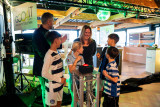What will happen if we scale up our hydrological capacity to a stunning level of 13% Amsterdam wide? Researcher Tim Busker explains this in our new video
Want to receive updates like this in your inbox?
Get notified about new updates, opportunities or events that match your interests.
Maybe you will also like these updates
Amsterdam and Haarlem launch groundbreaking sustainable artificial turf pitch innovations

The pioneering innovations were presented of the Scale Up Future-proof artificial turf pitches project, a collaboration between Amsterdam and Haarlem focused on sustainable artificial turf pitches. Over the next few years, more than 250 sports pitches in both cities will be transformed into circular, energy-generating and climate-adaptive sports venues. These artificial turf pitches can not only generate and store energy, but also involve smart water management. An approach that is globally relevant for urban sports infrastructure.
Three consortia collaborate on the sport pitch of the future
The three selected consortia Antea Sport, EnergieVeld and GOO4iT together comprise more than 15 market players. They join forces within this innovation partnership, where there is room for long-term collaboration, co-creation and scalable innovation. The pioneering solutions will make it possible to cool down sport pitches on warm days, help dispose of and collect rainwater, make the pitches more pleasant for the users and possibly even generate energy for the surrounding area. Find out how these innovations are shaping the sport pitch of the future here.
Two municipalities: joint procurement
The Scale Up Future-proof artificial turf pitches project is a unique collaboration between two municipalities and market players. The municipalities jointly procure pooling their purchasing power and use an innovation partnership to challenge the market to test and scale up innovative and sustainable solutions. In doing so, the solutions are also scalable and transferable to other cities in the Netherlands and Europe.
From prototype to pilot fields
The first prototype fields will be constructed in Amsterdam and Haarlem in 2026, in different capacities and combining multiple innovations, where they will be extensively tested and monitored for a year. Successful concepts are then scaled up to full-scale pilot pitches and tested and monitored for another year. This will form the basis for the new standard of sustainable sports pitches, with potential for adoption in other cities around the world. At the same time, existing pitches are already being improved with the most sustainable solutions available, making an immediate impact from the start. The project thus shows how cooperation between municipalities and market players can lead to innovative, climate-proof sports infrastructure with international relevance.
Join us
This project provides cities worldwide a blueprint for sustainable, smart, and future-proof artificial turf pitches. Interested municipalities and industry partners can get in touch and subscribe to our news updates by sending an e-mail to: sportveldvandetoekomst@amsterdam.nl.
Masterclass 3D-printen
Focussessie 3D-printen
Dinsdag 14 oktober 2025
11.00 – 17.00 uur
In deze verdiepende sessie ontdek je concrete toepassingen van 3D-printen.
Tijdens deze focussessie verwelkomen we:
<strong>Viktor Valk</strong>, Regional president bij Freemelt.
Viktor zal het gaan hebben over Electron Beam Melting. Een 3D-printtechnologie waarbij een elektronenbundel metaalpoeder selectief smelt, waardoor volledig dichte en nauwkeurige metalen opgebouwd kunnen worden.
<strong>Maarten van Rooij</strong>, Vice-president bij Ultimaker
Maarten gaat in op de laatste ontwikkelingen rondom materialen voor 3D-printen. Hij belicht hoe nieuwe kunststoffen, composieten en duurzame filamenten de mogelijkheden van 3D-printen vergroten.
<strong>René Tamboer</strong>, programmamanager digitalisering & circulaire maakindustrie bij TU Delft
René vertelt hoe de TU Delft onderzoek naar o.a. 3D-printen vertaalt naar concrete toepassingen voor bedrijven en de samenleving. Hij gaat in op de manier waarop nieuwe technieken en ontwerpen worden ontwikkeld in samenwerking met de maakindustrie, met aandacht voor duurzaamheid, efficiëntie en innovatie.
Je kunt individueel deelnemen aan deze focussessie, maar neem vooral je collega’s mee! Door ondersteuning vanuit het Europese programma EDIH is deelname aan deze focussessie kosteloos, wel dient er een staatsteunverklaring ondertekend te worden.
Innovation Dinner 3D-printen
3D-printen is allang niet meer alleen een techniek voor prototypes of kleine schaalmodellen. Inmiddels worden complete onderdelen, constructies en zelfs medische toepassingen geprint, met materialen die steeds sterker, duurzamer en veelzijdiger worden. De impact op de maakindustrie, bouw, zorg en vele andere sectoren groeit snel en daarmee ook de kansen voor bedrijven die deze technologie weten te benutten.
Ben je benieuwd hoe 3D printen jouw werk makkelijker, sneller of duurzamer kan maken? Wil je inspiratie opdoen en sparren met pioniers en experts over materialen, technieken en toepassingen? Meld je snel aan!
Wie is de gastspreker?
Tijdens het Innovation Dinner spreekt <strong>Herman van Bolhuis</strong>, oprichter van 3D Makers Zone en bestuurslid bij FME.
Vanuit zijn brede ervaring geeft hij een beeld bij de nieuwste ontwikkelingen in materialen, technieken en toepassingen.
Daarbij staat centraal hoe 3D-printen kan bijdragen aan innovatie en verduurzaming.
Wat zijn de kosten?
Dit Innovation Dinner is kosteloos.

